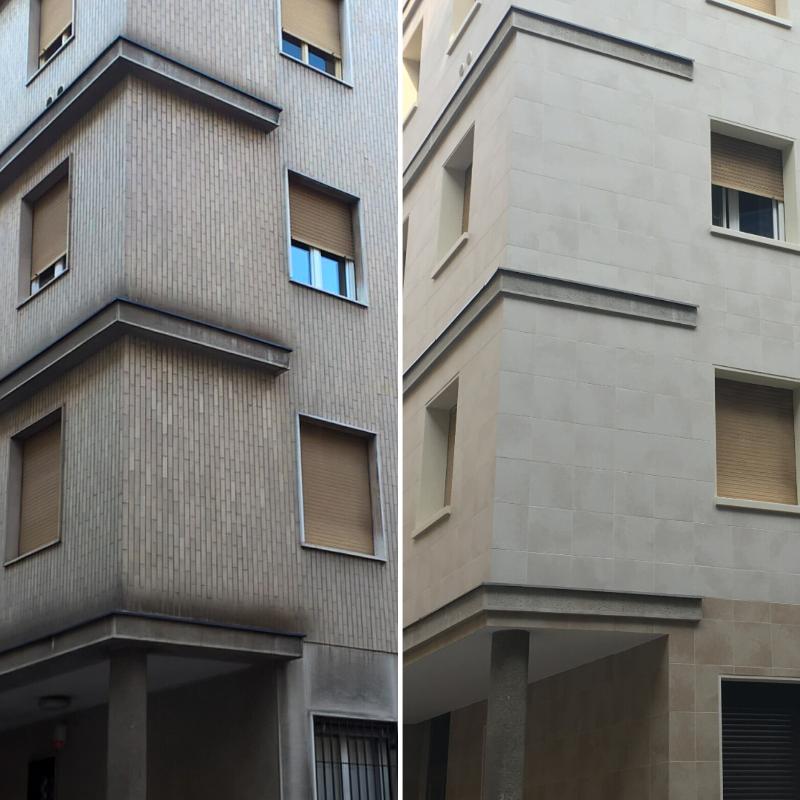Smart Cities. The energy redevelopment works of the condominium in via Passeroni have been completed
Smart Cities. The energy redevelopment works of the condominium in via Passeroni have been completed
Interventions on 28 thousand square meters of residential units to create the first low environmental impact neighbourhood. Tajani: “The project made it possible to reduce the building's polluting emissions by 65% and achieve energy savings of 59%”
Milan, June 27 2019 – Milan is increasingly attentive to respect for the environment. The works for the energy requalification of the building in via Passeroni 6 have been completed, the fourth of the five private residential buildings involved (along with via Verro 78, via Fiamma 78, via Tito Livio 7, via Benaco 26) in the European 'Sharing Cities' project ', in the area between the areas of Porta Romana and Vettabbia. To inaugurate the building and illustrate the levels of energy savings achieved by the city and the families involved, the councilor for employment policies, productive activities with responsibility for Smart Cities, Cristina Tajani, with representatives of ENEA, ANACI Lombardia, Assimpredil ANCE and the partners involved in the project.
“Innovation is not only that which develops in research institutes: it is first of all that which contaminates the daily behavior of citizens, starting from the living and sharing spaces such as condominiums. Thanks to the European Sharing Cities project, in which Milan participates together with London and Lisbon, good building redevelopment practices become current practice and improve the city". Thus comments councilor Tajani, who continues: "Thanks to these interventions we are experimenting with an urban redevelopment model in the city that will allow us to reduce energy consumption by around 60% in private and public buildings".
The European project, with a total value of 24 million euros, has allowed the municipal administration to intercept European resources worth approximately 8,6 million euros in five years, together with local partners. These sums are allowing, in addition to the redevelopment of the five privately owned buildings, the intervention on a public building (the complex in via San Bernardo 29 in Chiaravalle) for a total of more than 28 thousand square meters of residential units, compared to a project goal of 25.500 square meters. Furthermore, integrated energy management systems are being developed and smart wi-fi streetlights equipped with various types of sensors are being installed throughout the area, as well as the experimental design of the first condominium car sharing. All the interventions planned in the five private condominiums were co-designed with the listening and participation of the residents in order to involve them in the transformation of the neighborhood.
According to Damiano Di Simine, scientific director of Legambiente Lombardia, "the air conditioning of buildings represents the heaviest contribution of a city to the greenhouse effect and air pollution, but it can be significantly reduced: today the tax deduction regimes and the municipal tender BE2 which encourages energy efficiency are accessible to all; It is these opportunities that need to be known and seized immediately. Energy redevelopment means having cleaner air in a more beautiful city, but also lighter bills and better health. In short, today it is one of the most profitable investments that a family can make, because it also immediately increases the asset value of their property".
Specifically, the redevelopment of the building in via Passeroni 6 involved every common part of the building, from the facades to the basements and attics and the window boxes, up to the heating and energy systems, equipping the structure with a new and efficient heat generator and of photovoltaic panels and restoring the asbestos parts still present on the roofs and in the systems. The 70s building thus reduced its energy consumption by 59% and, consequently, its atmospheric emissions fell by almost 65%. Internal comfort is kept under control, both through the remote management of the systems and thanks to cutting-edge sensors.

The entire redevelopment was managed in BIM (Building Information Modeling) as part of the regional Smart Living B-Smart project. BIM is a methodology that allows the creation of a shared and continuously evolving information model of the history of the building; a real identity card of its history, its components and every intervention carried out over time.
The redevelopment process was managed by the Sharing Cities' project partners. In particular, the efficiency measures were carried out by Teicos UE S.r.l., together with Future Energy S.r.l for the plant engineering part. The innovative co-design process, which saw the active involvement of citizens in choosing the most suitable efficiency measures for each building, was conducted by the project team made up of: Legambiente, Milan Polytechnic (DASTU), Poliedra Consortium , Teicos Ue S.r.l., Future Energy S.r.l., all with the assistance and support of the Municipality of Milan.
Subjects:
Updated: 02/07/2019
